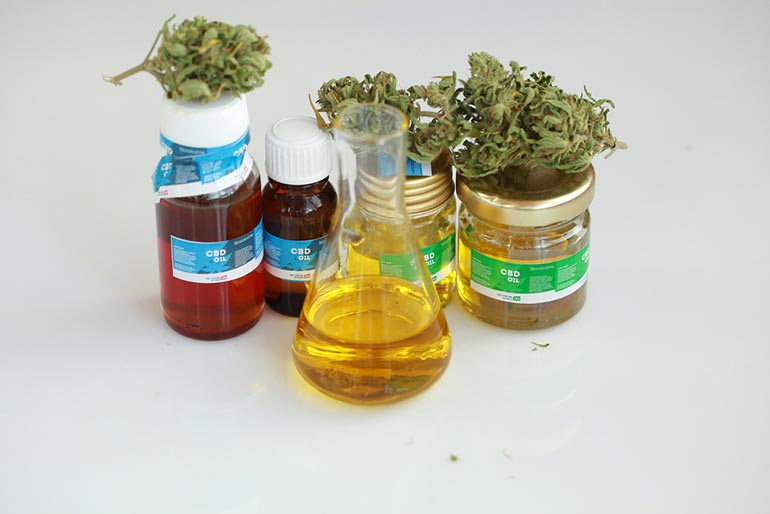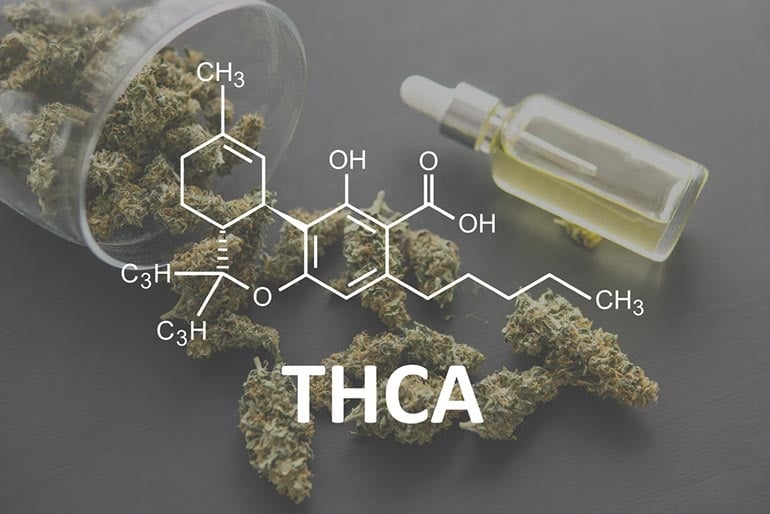Start 14-Day Trial Subscription
*No credit card required

What Is THCa and What Does It Do? The Difference Between THCa and THC
Unlock the secrets of THCa – the non-psychoactive precursor to THC in cannabis. Discover its unique characteristics, conversion process and potential health benefits. Whether you're seeking therapeutic relief or recreational enjoyment, make informed choices with our comprehensive guide on THCa vs THC.
THCa Products On the Market

Here are some common types of THCa products:
- THCa Tinctures: These are liquid extracts that can be taken sublingually (under the tongue). THCa tinctures are popular for precise dosing and can be an easy way to consume THCa without smoking or vaping.
- Raw Cannabis Juices and Smoothies: Raw cannabis leaves and flowers are rich in THCa. Juicing these parts of the plant provides a non-psychoactive way to consume THCa. These juices can be mixed with other ingredients like fruits or vegetables to enhance flavor and nutritional value.
- THCa 'Diamonds': These are crystalline structures of THCa often found in high-quality cannabis concentrates. They are typically used in dabbing, a form of vaporization, but heating THCa diamonds converts them to THC, thus inducing psychoactive effects.
- Cannabis Topicals: Some topicals, like creams or balms, might contain THCa. These are applied directly to the skin and are often used for their potential anti-inflammatory and pain relief benefits without causing psychoactive effects.
- Raw Cannabis Edibles: Unlike traditional cannabis edibles that contain THC, raw cannabis edibles use unheated cannabis, preserving the THCa content. These can include salads, dressings or cold-prepared foods incorporating raw cannabis.
- Transdermal Patches: These patches release THCa slowly over time through the skin. They are used for consistent, long-term delivery of THCa for potential therapeutic benefits.
THC or THCa: Which is Better?
When it comes to choosing between THC and THCa, the question of which is "better" largely depends on what you're looking for in terms of effects and benefits. Both compounds have unique properties and potential uses.
Let's compare them to understand which might be more suitable for different needs.
THC for Psychoactive Effects and Pain Relief
THC stands out for those seeking the psychoactive 'high' synonymous with cannabis. Ideal for both recreational enjoyment and certain therapeutic applications, THC alters perception, mood and consciousness.
It's particularly effective in pain management, aiding sleep and stimulating appetite in patients undergoing treatments like chemotherapy.
However, users should be aware of possible side effects such as anxiety and short-term memory disruptions, especially at higher doses.
THCa for Non-Psychoactive Health Benefits
THCa is the choice for those exploring the health benefits of cannabis without the intoxicating effects. Lacking the psychoactive impact of THC, THCa is being researched for its potential in reducing inflammation, protecting nerve cells and combating nausea.
It's a promising avenue for alternative treatments, especially for chronic conditions like arthritis or as a complementary therapy in cancer treatment. The ongoing research into THCa means its full benefits and effects are still being uncovered.
Legal Considerations and Accessibility of THC vs. THCa
The choice between THC and THCa is also influenced by their legal status, which varies significantly by location. THC, due to its psychoactive properties, often faces stricter regulation, whereas THCa, being non-intoxicating, may have more lenient legal constraints.
This factor is particularly crucial for medicinal users, who should always check the legality of these substances in their area before proceeding.
Impact of Consumption Methods on THC and THCa Intake
The way you consume cannabis directly affects whether you're ingesting THC or THCa. Smoking or vaping primarily delivers THC due to the heat-induced conversion of THCa.
On the other hand, consuming cannabis in its raw form, like in salads or smoothies, means ingesting THCa. Your preferred method of consumption will dictate the type of experience and benefits you receive.
Personal Tolerance and Sensitivity to THC vs. THCa
Everyone reacts differently to cannabis compounds. While some may enjoy the effects of THC, others might find them overwhelming. Conversely, THCa offers milder, non-psychoactive effects that might be preferable for some users. Understanding your body's reaction and comfort level with each compound is key in making an informed choice.
Side Effects and Safety Profile of THC and THCa
THC is associated with certain side effects like dry mouth and red eyes, and can impact short-term memory. On the other hand, THCa is generally considered safer due to its non-intoxicating nature, although the full extent of its side effects and long-term impact is still being studied.
So that means the choice between THC and THCa depends on your desired effects, legal considerations, preferred consumption method, and personal tolerance and sensitivity.
Both compounds have their own unique benefits and potential uses.
If you are considering them for medicinal purposes, it's advisable to consult with a healthcare professional for guidance tailored to your specific health needs.
Looking to Buy Legal Cannabis, Hemp, Delta 8, 9, 10 or CBD?
Shop Galaxy Treats: (25% Off with 25LIFE)
Shop Blue Moon Hemp: (10% Off with CBD10LIFE)
FAQs (Part 1)
After reading this, you might still have some questions about THC and THCa. Here are a few frequently asked questions that might answer any lingering queries.
Can THCa Cause a High?
THCa itself does not cause a high. It's a non-psychoactive compound found in the raw cannabis plant, meaning it doesn't affect your mind or give you the euphoric feeling that THC does.
The high only comes into play when THCa is converted into THC, a process that occurs when it's heated, like during smoking or baking. So, if you consume raw cannabis (which has THCa), you won't experience the high associated with THC.
How Powerful is THCa?
The 'power' of THCa isn't in making you feel high; it's in its potential health benefits. Researchers are looking into its possible anti-inflammatory and neuroprotective effects. This means it could help reduce inflammation in conditions like arthritis or protect nerve cells in diseases like Alzheimer's to calm down central nervous system.
However, it's important to note that these benefits are still being studied, and THCa doesn't have the psychoactive power of THC, which is what gives the sensation of being high.
What Percent of THCa is Considered High?
In the cannabis world, a high percentage of THCa typically means the plant can produce strong effects once it's converted to THC. Generally, cannabis strains with over 20% THCa are seen as potent. But remember, the actual effect you feel from THC depends on how much THCa is converted, which varies based on how you use the cannabis (like smoking vs. baking it).
Is Delta-8 and THCa the same thing?
No, Delta-8 and THCa are not the same thing. Delta-8 is a minor cannabinoid that occurs naturally in the cannabis plant, while THCA is the acidic precursor to THC and is found in raw cannabis. Delta-8 is known for its mildly psychoactive effects, while THCA is non-psychoactive until it is heated and converted into THC.
Does THCA turn into Delta-9?
Yes, THCA can turn into delta-9 THC through a process called decarboxylation, which occurs when heat is applied to the compound. This is why it is important to heat or "decarb" raw cannabis if you want to experience the psychoactive effects of THC.
However, it's worth noting that the amount of delta-9 THC produced from THCA through decarboxylation can vary depending on factors such as room temperature and time. Furthermore, other cannabinoids like CBD may also be produced.
FAQs (Part 2)
After reading this, you might still have some questions about THC and THCa. Here are a few more frequently asked questions that might speak to any lingering queries.
Is THCa Marijuana?
THCa is a compound found in cannabis extracts, which is the same plant that marijuana is derived from. However, THCa is not equivalent to marijuana as it is the raw, unheated form of THC (tetrahydrocannabinol) and does not have psychoactive effects like marijuana does.
Does THCa Show Up on a Drug Test?
Most drug tests are designed to detect THC, not THCa. However, since THCa can turn into THC in your body, especially when heated, it's possible it could contribute to a positive test result.
The likelihood depends on how sensitive the drug test is and how much THCa you've consumed. It's a bit tricky because THCa itself isn't what these tests are looking for, but its conversion to THC could be a factor.
Will THCa Stay Legal?
The legality of THCa is a bit of a gray area and can vary depending on where you are. Since it's non-psychoactive, it's often treated differently from THC. However, cannabis laws are constantly evolving, and as we learn more about THCa, legal statuses could change. It's always best to stay updated with the current laws in your area regarding THCa, THC, cannabis and more.
Can THCa be Shipped?
Shipping THCa hinges on legal regulations, which vary widely. In places where THCa is legal, you might be able to ship it. But this is a complex issue because laws around cannabis and its compounds can be intricate and are frequently changing. If you're considering shipping THCa, it's crucial to thoroughly understand and comply with all relevant laws, both where you're shipping to and from.
Can THCa be Vaped?
You can vape THCa, but when you do, the heat involved in vaping transforms the THCa into THC. So, while you're technically vaping THCa, what you're actually consuming is THC and all the psychoactive effects that come with it. Vaping heats the cannabis enough to cause this conversion, meaning you'll experience the high associated with THC, not THCa.
Can THCa be Smoked?
Smoking THCa is similar to vaping it. The heat from smoking changes the THCa into THC. This means when you smoke cannabis, you're essentially experiencing the effects of THC. The heat from the flame causes the THCa in the plant to decarboxylate, turning it into the THC that affects your brain and body.
Can THCa Make You Sick?
Generally, THCa itself isn't known to make people sick because it doesn't have the psychoactive effects of THC. However, everyone's body reacts differently to different compounds.
Some might experience discomfort or adverse reactions, but this is less about the THCa and more about individual sensitivities. If THCa converts to THC (through heating), then you might experience the side effects associated with THC, like dry mouth, dizziness or anxiety.
Pages
- « first
- ‹ previous
- 1
- 2
- 3



